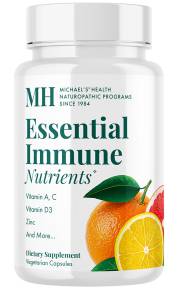Among the nutrients the body needs, vitamin A stands out for the many functions it performs in the maintenance of optimal health, including in reproduction, growth, cellular function, and vision.
This antioxidant vitamin is also critical to the immune system.
How Vitamin A Supports Immunity
Supporting immunity in two ways, vitamin A stimulates “the production and activity of white blood cells (antiviral and anti-tumor cells)” and maintains “and strengthens epithelial tissues and mucous membranes—the body’s first line of defense against pathogens,” according to In and Out Express Care.
Epithelial tissue, collectively called the epithelium, forms the covering on both internal and external body surfaces, lines body cavities, and is the main tissue component of glands.
“The epithelium lines all outer surfaces and most inner surfaces of organisms, and it functions as the ‘front line’ of defense against pathogen invasion.”
Vitamin A “is involved in the development of the immune system and plays regulatory roles in cellular immune responses,” according to the authors of a literature review in the Journal of Clinical Medicine.
Dietary Sources of Vitamin A
The body can put this fat-soluble vitamin right to work from the preformed version—called retinoid or retinol—found in animal foods (including liver, fish, fish oil, eggs, yogurt, and fortified milk).
Or it can manufacture vitamin A from the plant-based beta carotene in colorful fruits and vegetables (especially those that are yellow, red, and orange, such as carrots, cantaloupe, and pumpkin, but also dark-green veggies like kale and broccoli).
Vitamin A Deficiency
Because one cause of vitamin A deficiency is a dietary lack of the vitamin itself or of its precursor, beta carotene, the condition is rare in the US.
However, liver disorders and the inability to absorb fat from the diet—as in alcohol-use disorder, bile-duct blockage, celiac disease, chronic diarrhea, and cystic fibrosis among other conditions—can also contribute to a deficiency.
Vitamin A Toxicity
Too much vitamin A can be dangerous and is more likely to occur in this country than is a deficiency. Because it is a fat-soluble vitamin, excess vitamin A is stored in fat tissue and in the liver, which can lead to toxicity.
One way to prevent this is to avoid retinol or retinoid supplements, using only plant-based beta carotene supplements, which do not build up in the body.






